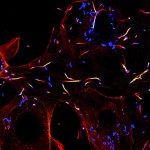Lien vers Pubmed [PMID] – 22845035
Allergy 2012 Oct;67(10):1233-40
BACKGROUND: Mast cells are important effector cells in allergy. They usually have a long life span and resist cell death induction. Fcγ receptor- and IgG immune complex-mediated apoptosis has been demonstrated in B-lineage cells, but not in mast cells. The aim of the current study was to investigate whether mast cells could respond to apoptosis induction by IgG immune complex aggregation of Fcγ receptors. It is known that mouse mast cells express the low-affinity Fcγ receptors FcγRIIB and FcγRIIIA, which bind IgG especially in the form of antigen-IgG immune complexes.
METHODS: Mouse bone marrow-derived cultured mast cells were examined for surface expression of FcγRIIB and FcγRIIIA. Apoptosis of such cells from wild-type, FcγRIIB(-/-) or FcγRIIIA(-/-) mice was measured following receptor aggregation by IgG immune complexes.
RESULTS: Our data demonstrate that aggregation of either FcγRIIB or FcγRIIIA by IgG immune complexes induced apoptosis of mouse bone marrow-derived cultured mast cells. However, mast cells expressing both FcγRIIB and FcγRIIIA were able to resist cell death induction by IgG immune complexes.
CONCLUSION: Our findings reveal a fine-tuning system for regulating mast cell apoptosis through aggregating Fcγ receptors by IgG immune complexes. Such apoptosis regulation may have a substantial impact on mast cell homeostasis during allergic inflammation.

